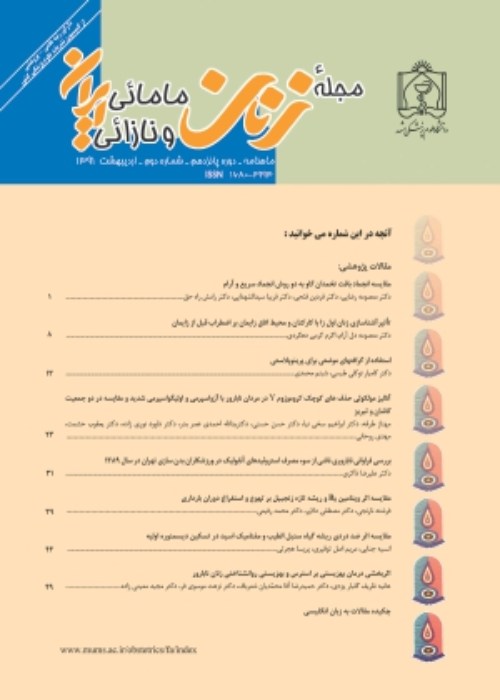Meconial amniotic fluid and maternal and neonatal outcomes
One of the major problems of the fetus is the excretion of the contents of the fetal intestine in the amniotic fluid sac or the amniotic fluid stained with meconium. If the time of stained with meconium is long or if the meconium is thick, it leads to serious risks for the mother and the fetus. The present study was conducted with aim to investigate the prevalence of babies born with meconial stained amniotic fluid and the associated maternal and fetal complications.
This cross-sectional study was conducted in a period of 6 months (Dec 2014 to June 2015) on 1383 women with a singleton pregnancy and a gestational age of more than 28 weeks who had referred to Omolbanian Hospital in Mashhad due to the onset of labor pains. The investigated information included: mother's age, gestational age, number of pregnancies, mode of delivery, amniotic fluid condition, baby's gender, baby's Apgar, ABG (arterial blood gas), birth weight and the need for baby resuscitation. Data analysis was done using SPSS statistical software (version 22) and t-test and chi-square statistical tests. P< 0.05 was considered statistically significant.
In the present study, out of 1383 cases of normal delivery, 114 cases had meconium-stained amniotic fluid (prevalence of 8.2%). The number of cesarean section was higher in the thick meconial group (26 cases (%43.3)) compared to thin meconial group (9 cases (16.7%)) (p=0.002). The amount of abnormal ABG was 10 cases (8.7%) in the meconial group, of which 6 cases (5.2%) were in the fetal distress group. The amount of abnormal ABG was 8%, which was significantly higher in the thick meconial group (p=0.002). First minute Apgar less than 7 was more in the thick meconial group (p=0.01) and 5th minute Apgar had no difference between the two groups. There were no cases of convulsions or death of infant in the two groups.
In this study, the prevalence of amniotic fluid stained with meconium was 8.2%. Although the rate of cesarean delivery was higher in the thick meconial group, there was no significant difference in fetal distress in the thick and thin meconial groups. Considering the complications of cesarean section for the mother, natural delivery can be a choice method in these mothers and cesarean section is limited to cases of fetal distress or thick meconium far from delivery.
- حق عضویت دریافتی صرف حمایت از نشریات عضو و نگهداری، تکمیل و توسعه مگیران میشود.
- پرداخت حق اشتراک و دانلود مقالات اجازه بازنشر آن در سایر رسانههای چاپی و دیجیتال را به کاربر نمیدهد.


